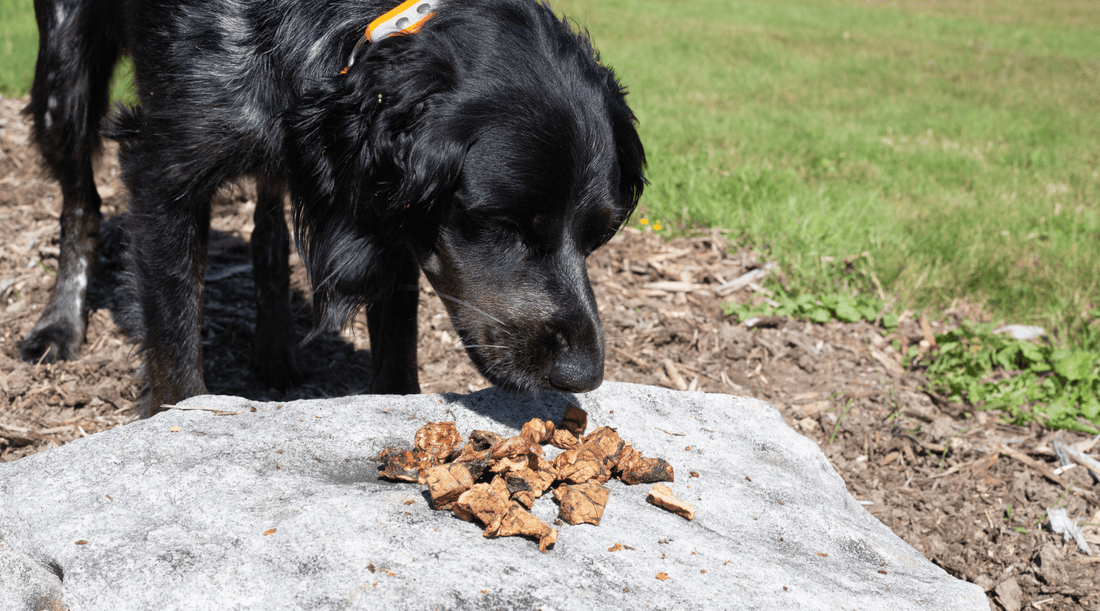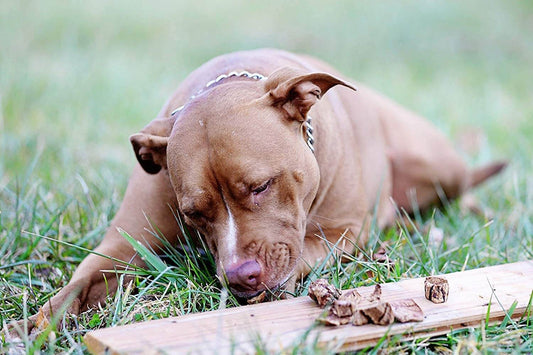
Can Dogs Have Too Much Protein? From Just Enough to Optimal Health
Dawn Miller Dec 28, 20246 Minute ReadCan dogs have too much protein? I'm certain most dog parents have asked this question as I have. Similar to human nutrition, the answer goes beyond a single Recommended Daily Allowance (RDA)
Last Thursday, I was walking through our neighborhood park with Bruno, my lovable lab mix, and Pixie, my energetic terrier, when I overheard a couple discussing their dog's new diet.
One said, “We’re switching to a high-protein dog food to help him bulk up and stay healthy.” The other replied, “But isn’t too much protein bad for dogs?” I smiled because, as a devoted dog mom, I get the confusion.
Why Is Protein Important for Dogs?
Protein is an essential nutrient for dogs—and, of course, humans. While dogs and their less hairy companions (us) make it, they must have the amino acids to do it. And when they don't, they must pull it from somewhere in the body. They obtain what they need through food.
The protein that results serves several functions in the body:
- Building and repairing tissues - Protein supports healthy muscles, skin, joints, and coats.
- Immune function - The amino acids that make protein are key in keeping your pup’s immune system strong. The antibodies that fight infections are made of these amino acids.
- Energy production - While fats and carbs are often primary energy sources, protein is also a backup energy supply.
So, getting enough is very important. But, like everything, too much of a good thing is certainly possible.
Even when you feed them the best dog treats, you can have issues with excessive consumption.
Can Dogs Have Too Much Protein?
The short answer is yes—they can have too much protein, especially if you're trying to wing it. Now, what do I mean by that?
If you're trying to build your dog's diet from scratch instead of giving them veterinarian-approved dog food, you'll probably run into issues quickly.
Excess protein causes a couple of primary issues in a dog's body.
Digestive Upset
Dogs' bodies often treat the excess as poison, trying to eliminate it as fast as possible through vomiting or diarrhea. They may also have gas as undigested protein reaches the colon.
Here, the gut microbiome tries to break it down and produces a lot of methane or sulfur gas.
Very stinky–and sometimes messy–stuff!
Kidney Strain
If your dog has pre-existing kidney issues, high-protein diets can make the problem 10 times worse. While healthy dogs don’t typically experience some kidney strain from extra protein, the kidneys are built for some excess from time to time.
Unhealthy kidneys, on the other hand, will struggle regardless. This leads to a build-up of toxins in the blood.
Fat Weight Gain
Since protein is also an energy source, dogs can use some to support their energy needs. But this can also lead to an energy surplus.
When energy consumption exceeds energy burn, the dog stores the excess as fat. In overweight or obese dogs, this becomes a problem over time.
Nutritional Deficiency
If too much of the diet is protein, they may not get enough of something else. For example, dogs need fiber, too. I might envision a wolf chomping on a deer in the wild. But that same wolf eats berries, grains, grasses, tubers, squash, and edible mushrooms.
Are High Protein Diets Good for Dogs?
High-protein diets can be incredibly beneficial. But these diets must be done correctly.
Active dogs, puppies, and working breeds often need more protein-rich foods because they need that extra fuel and building material for their lifestyle. Additionally, senior dogs who don't have kidney problems may benefit from extra protein, as it can reduce muscle loss.
Is Dog Food High-Protein?
Kibble is not typically high-protein. Adult food must be 18% protein for proper growth, while puppy food is usually 22%- 32%. Governing organizations like the Association of American Feed Control Officials (AAFCO) set these minimum limits to avoid deficiency in most dogs. This does not take into account individual dogs' protein needs. So, it's a starting point on which I work to ensure my dogs are covered.
It's not optimized for my individual dogs' dog health.
Ideally, as a dog mom, I do support my dog's diet with added protein for dogs from high protein dog treats and dog bones.
But how can I, as a dog mom, ensure I'm not giving them too much? I have to be observant.
How I Know My Dogs Are Getting Enough Protein
A shiny coat, strong muscles, steady energy levels, and healthy digestion are my telltale signs that Bruno and Pixie are getting the right amount of protein. If their appetite dips, their coats lose luster, they're losing muscle, or they seem more tired than usual, it’s a cue for me to reassess their diet.
How to Make Sure They're Not Getting Too Much Protein
1. Realize Their Ancestral Wolves Aren't Carnivores
High protein doesn't mean mostly protein. One mistake people make is thinking their dog is supposed to be on the Carnivore Diet. Dogs are not carnivores. They are omnivores.
Once weaned, they eat meat, plants, and the occasional insect, too. This is their natural and ideal diet.
One way I accomplish this is by adding variety to their dog treats. When the marrow is gone, I refill a beef marrow bone with other dog-approved foods like pumpkin, berries, or plain yogurt. You can find recipes and tips in this free marrow bone refill guide.
2. Watch for Signs of Excess
Fat weight gain, problematic kidney test results, dog diarrhea, vomiting, and dog gas clearing the room are signs of too much protein.
3. Choose High Quality Protein Dog Treats
Those bagged grocery store dog treats that say "high protein" often come with a lot of filler, questionable additives and preservatives.
Opt for single ingredient, high protein dog treats, such as grass-fed beef organ meat treats and beef marrow-filled dog bones.
Because they don't contain any questionable ingredients, I know they're 100% about dog health.
4. Limit Treats to 10% of the Diet
Managing treat consumption can reduce the risk of exceeding the protein maximum while giving me the freedom to treat my dogs and deliver added nutrition through healthy dog treats and bones.
Limiting dog bone chew time to 15-20 minutes 2-3 times a week can avoid overindulgence.
High Protein Treats My Dogs Love
I want treats that are both healthy and high in protein—but not overly so. Each of these has around 30%+ protein plus tons of vitamins, minerals, and health-promoting compounds (e.g., glucosamine)
1. Beef Lung Bites
Lightweight, single-ingredient, and packed with protein, beef lung bites are perfect for training sessions or as a quick reward. They’re rich in B12 and collagen, which support energy, digestion, and joint health.
If you want to try beef lung bites for your dogs, you can buy them in bulk on Amazon. It's a great deal and a great way to promote dog health.
2. Beef Trachea Chews
These chews are a mix of protein and joint-supporting nutrients like glucosamine and chondroitin. Plus, they double as a natural toothbrush for your dog’s dental health. I give pups a trachea chew at least once a week.
3. Marrow Bones for Dogs
A high-protein treat that keeps on giving! The marrow inside provides healthy fats and collagen, while the bone itself offers hours of chewing entertainment and more teeth-cleaning action. My K9s love the Dynamo Bone for K9 Connoisseur.Available On:





